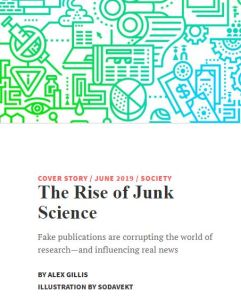Join getAbstract to access the summary!

Join getAbstract to access the summary!
Alex Gillis
The Rise of Junk Science
Fake Publications Are Corrupting the World of Research – and Influencing Real News
The Walrus, 2019
What's inside?
Competition within the scientific and academic communities spurred a rise in problematic publishing ethics.
Recommendation
While this article may seem applicable only to the narrow world of professional scientists and academics, the problem it describes has broader ramifications. Publications of dubious merit can spread misinformation, influence public behavior and ultimately devalue legitimate work. The advent of so-called junk science also serves as a cautionary tale about the power of personal ambition and how the democratizing force of the internet can lead to abuse. Investigative journalist Alex Gillis’s sobering analysis is emblematic of the challenges of the digital age and should be requisite reading to improve awareness and foster change.
Summary
About the Author
Alex Gillis is an investigative journalist and feature writer.

















Comment on this summary